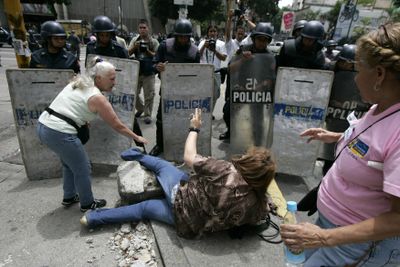Chavez’s decrees spark protests
Venezuela’s president issues 26 new laws

CARACAS, Venezuela – Riot police used tear gas Wednesday as they blocked hundreds of Venezuelans protesting what they call new moves by President Hugo Chavez to concentrate his power. The demonstrators said a blacklist barring key opposition candidates from elections and a series of socialist decrees are destroying what’s left of their democracy.
Though the protest of about 1,000 people chanting “freedom!” was small compared to past marches, there is a growing public outcry over the sidelining of key government opponents ahead of state and local elections in November.
Chavez opponents also are outraged by 26 laws the president just decreed, some of them mirroring the socialist measures voters rejected in a December referendum.
Chavez said in a speech Wednesday night that their concerns are grossly overblown.
“This is a democracy. They call me a tyrant – tyrants govern without laws. We’re making laws, and all those laws are for the benefit of the country,” Chavez said.
Chavez issued the decrees just before the expiration of special legislative powers that allowed him to make laws without National Assembly approval for the past 18 months.
For a time after the defeat of his constitutional referendum – which would have imposed radical economic changes and let him run for re-election indefinitely – Chavez seemed to be taking a more pragmatic, less confrontational approach to his socialist project.
But the decrees suggest the leftist leader is pushing hard again to remake Venezuelan society.
“We said in the referendum that we didn’t want that, and now he’s put it in the decrees,” said protester Josefina Bravo.
One decree establishes a civilian militia that critics warn could emulate the citizen groups that control many aspects of community life in Cuba. Another gives Chavez the ability to designate regional authorities who critics say could undermine the power of locally elected officials.
Other decrees empower Chavez to expropriate goods from private businesses and increase state control over food, punishing business owners who fail to comply with price controls or other regulations with fines, closure and even 10-year prison terms.